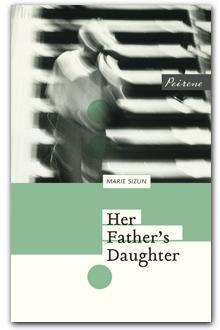| At four and a half, the child is blissfully content in the Paris apartment she shares with her mother. The war means little to her and, while her grandmother disapproves of her freedom to do as she likes, her mother always takes her side. The only cloud in her blue-sky world is the lie told by the two older women when they insisted the baby sister she’d seen presented to her mother in a Normandy hospital was a figment of her imagination. |
There the father is, always in the same place, opposite the mother, sitting very upright, looking worried. He’s watching. He notices everything. The child now has to stay seated for the entire meal … The father can’t bear the sound of chewing. If the child ignores this rule, something terrifying happens. The father goes red, bangs on the table, screams that he was hungry for four whole years, he saw men die, that the very sight of this picky little girl is unbearable, intolerable, scandalous … The mother starts to cry. The child shakes … the father feels the same as the grandmother: the child’s been very badly brought up. But it’s not too late. We’ll break her in, he says. He’s going to do just that.
Soon the child recognises that power resides with the father, her mother reduced to a simpering servant. The child switches her allegiance to the father, courts him like a lover, feeling a frisson of triumph when, instead of making her walk ahead of the couple when they’re out as a family, he takes her hand. Yet she still feels the need to reinforce her position as her father’s favourite and she’s still stung by her mother’s lie. So she gives away the secret that will break the family apart.
Her Father’s Daughter is a poignant story of lost innocence, and of the casual mistreatment of children reminiscent of the psychoanalytic writings of Alice Miller. The sense of deprivation and unfairness is perfectly encapsulated when the child glimpses another father playing with his daughter (p141):
He has that gleam of admiration and tenderness … he throws himself at his daughter, picks her up in his arms, way up high, and spins her around with him. She shrieks with mock terror and delight.
I did, however, find the resolution, when the now grown woman is able to recognise what she did receive from her father, a little too pat, albeit necessary for her personal development. Nevertheless, Her Father’s Daughter is a beautiful novella in deceptively simple language with great psychological depth. It’s translated by Adriana Hunter and published by Peirine Press who provided my advance copy.
With the child’s unusual name, France, synonymous with that of her country, I wondered if this novella was also intended to be read as an allegory, but there was no mention of this with the publisher’s notes and I’m not enough of a Francophile to work this out for myself! I did read, however, that this was the author’s first novel, published in French in 2005 when she was sixty-five years old. Hearteningly, for we older women writers, she’s gone on to publish six more novels and a memoir. In an essay in the publisher’s newspaper she describes how the story is strongly embedded in her personal story, which has shaped the woman she became, but she didn’t want to write it as memoir, chiming with my own preference for transforming memories into fiction. Here’s an extended extract of that essay (p14):
it took me almost a lifetime to find the voice and words for this book, which was much more than a novel to me, it was really analysis. I urgently needed to speak out if I ever hoped – and I always had – to write about a painful period of my childhood which had a profound effect on me and probably altered the course of my entire life. Her Father’s Daughter is the story of a love destroyed, the love a little girl feels for a father she has only just had the delight of discovering but who is snatched away from her again … I have never completely recovered from his leaving, from the vacuum he left behind or the injustice done to me. I needed to tell this story. To speak about that wound. But I didn’t want to present this painful narrative as autobiography, or to speak in my own name: even though what I had to say was eminently personal, I … wanted to use the medium of a novel to relate the cruel misadventure of a child who could have been absolutely any child involved in an adult crisis … I changed the names of characters from my own family history, and the places, but kept the essence: it is as accurate as possible an account of the child’s emotions, but a distanced, objective, almost cold version because it is revised and moderated by the adult I am now. Besides, there was no intention to explain anyone’s behaviour, merely to demonstrate it in actions, to give it a context, to reveal it with spoken words, with gestures: it’s up to the reader to glean what I myself started to glimpse.
I’m hoping Peirine will publish more translations from this author – otherwise I’m going to have to brush up on my French!






















 RSS Feed
RSS Feed





















